Benvenuti - we’re in Rome and all routes lead to RIPE 87! As always with RIPE Meetings - sure you can view the slides, you can watch the recordings - but if you really want to have your finger on the pulse you ought to be reading this daily meeting blog!
Friday: Wired like Spaghetti
After a sparkling evening at Villa Miana, attendees gathered for the last day of RIPE 87. It’s been a grande week with 557 attendees onsite and 171 attendees online.
Plenary
RACI attendee, Thomas Wirtgen, introduced a new xBGP tool with an updated BGP workflow. He argued that Innovation in routing is slow (as were many of us after the RIPE dinner!) and current routing practices are too complex.
Robbie Mitchell then spoke on Indexing Europe’s Internet Resilience. He introduced their Internet measuring project, Pulse, to track Internet shutdowns and the economic loss they cause, as well as technologies and Internet resilience. He provided some lessons learnt on the Internet resilience based on the latest outages in Australia, Canada and Italy. The BGP-related outage in Australia caused disruption that lasted 19 hours, affecting banking, traffic lights, and other vital areas.
Mariano Scazzariello presented on a ROSE-T tool that automatically verifies MANRS Compliance for network operators. He explained the ROSE-T configuration step by step.
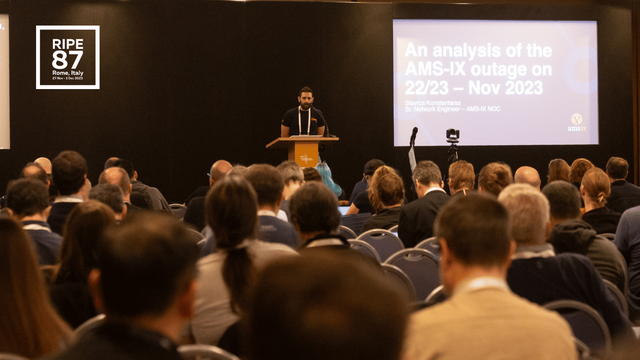
Stavros Konstantaras presented on probably one of the hottest topics of the past week - the AMS-IX outage. Now we know what the day of an AMS-IX network engineer looked like: isolation of routers, looking for suspicious customers…Stavros gave Kudos to the NOG team for stopping everything to work on fixing the issue and supporting each other to fix it. There was a sweet moment of support from people at the mic thanking Stavros for sharing the incident report.
Emile Aben from the RIPE NCC continued to talk about outages and presented his research on Internet routing around damage from the perspective of RIPE Atlas.
Although he was feeling like a ‘vulture’ for jumping immediately on these kinds of outages, it's a very important topic to share. He analysed three case studies: AMX-IX, DE-CIX, and LINX. His conclusion was that this happens and we’re all human. He said he did see that the Internet routes around damage for large IXPs, but there is still a question if this is the case for smaller IXPs. Peter Hessler noted that Black Friday could be responsible for this… (he said that outages may be happening during the holidays.)
Closing Plenary
Daniel Wagner started the Closing Plenary with his presentation on how to operate a telescope without operating a telescope. In this talk, he argued that telescopes do not need dedicated address space. Rather it suffices to focus on address space that is unlikely to be in use.
Menno Schepers presented the technical report, diving into the, ahem, interesting dynamics in the venue.
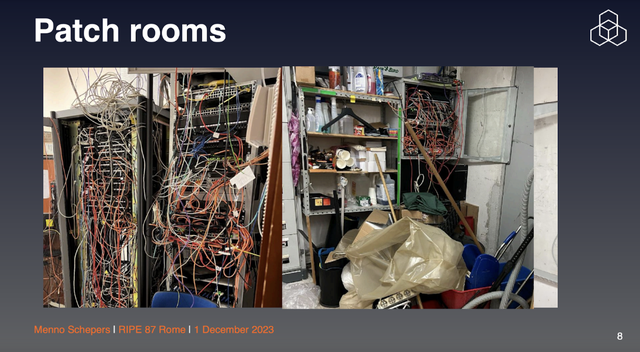
There was a cheer for an IPv6-only meeting network. One thing that was strange was the uptick in the legacy 2.4ghz network (Benedikt speculated that this could have been to do with the 2.4ghz to be more reachable). Menno also talked about how DDR was being used, and appeared to be creating issues.
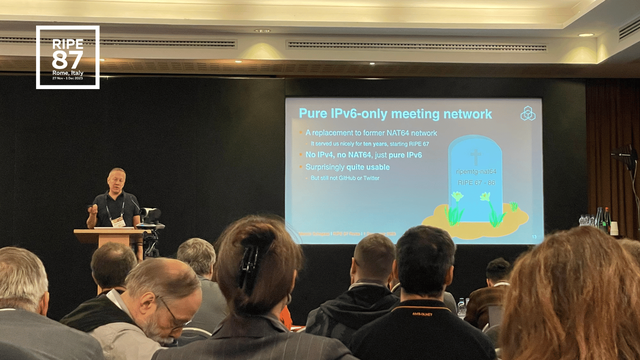
After the Tech report, the RIPE Code of Conduct (CoC) Team presented their report. Sebastian Becker said that there had been three reports. He reminded attendees of how to report to the team and invited people to join the CoC Team for future meetings.
Ciao e arrivederci!
There’s no Closing Plenary without RIPE Chair Mirjam Kühne saying hello to new appointments and goodbyes to others. She announced that Constanze Bürger had been elected onto the NRO NC, she said she was very happy and honoured, and is ‘open for discussions, talks and…a beer!’ Congratulations Constanze!

She thanked outgoing Working Group Chairs Kurtis Lindqvist, RIPE NCC Services who was Chair for twenty years, João Damas, DNS and Benedikt Stockebrandt, IPv6.
Congratulations to our new Working Group Co-Chairs Doris Hauser (DNS) Janos Zsako (NCC Services) Alex Le Heux (Address Policy) Christian Seitz (IPv6) and David Tatlisu (Database). Mirjam also thanked the Programme Committee and outgoing PC members Alexander Azimov and Dmytro Kohmanyuk. Valerie Aurora and Franziska Lichtblau were announced as incoming PC members - congratulations!
Mirjam ended RIPE 87 with prizes, big thanks to our hosts NAMEX (who treated RIPE NCC organisers with some pasta and timer to eat it the proper Italian way). She thanked all our sponsors and the organisation team.
As the meeting came to an end, the venue filled with the Italian Red Cross, leading to some questions.
And then, well actually, we’re really not allowed to say anymore…Grazie and arrivederci!
Thursday: RIPE Was Not Built in a Day
On Day 4,there was an unexpected 85% increase in jollyness as Christmas decorations were set up around the event venue.
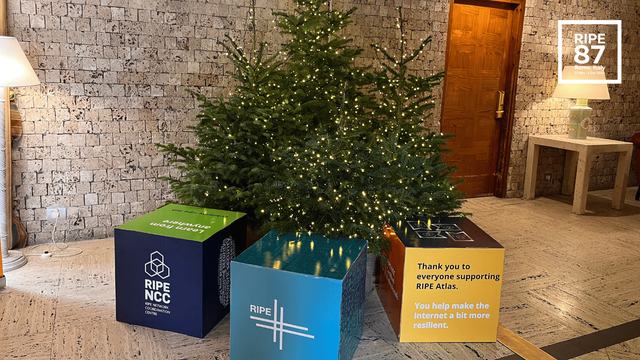
The day started with Open Source and Database Working Groups sessions. In Open Source, three candidates for the chair position, Christian Scheele, Luka Perkov, and Sasha Romijn, came on stage and introduced themselves.
Valerie Aurora from Frame Shift Consulting discussed the issue of deciding who gets the credit in open-source projects, starting with two concrete examples that inspired her talk. Maria Matejka from CZ.NIC talked about external patches and managing them based on aspects such as their size, quality and the introduction of new features as a BIRD developer. Martin Winter from NetDEF described the process of testing open source software, with examples taken from the FRRouting project.
In Database, David Tatlisu, the new Database working group co-chair, gave an update on the Numbered Work Items (NWIs). Edward Shryane from the RIPE NCC gave the RIPE Database operational update. With a minor comment, Ed introduced a major change: the database web application is now open source! The database documentation is also available as open source under a non-commercial licence. Mark Kosters from ARIN gave an IETF-style presentation on the geolocation attribute in RDAP.
- Who thinks it's a good idea? - Silence...
- Who thinks it's a bad idea? - Complete silence…
While everyone was still awake, Edward also presented his impact analysis for NWI-4 and invited people to give feedback on the mailing list.
In Connect the connectors connected. Co-chairs Florence Lavroff, Will van Gulik and Remco van Mook (remotely thanks to the "dreaded double line" on a COVID test) welcomed attendees to the session. Marco Paesani (Open-IX) gave an artful view of where Open-IX stands in today's interconnection landscape. We then heard updates on the development of a BCOP on the use of IRR databases for building and maintaining IXP route servers (Stavros Konstantaras), recent changes with PeeringDB (Leo Vegoda), and EuroIX (Bijal Sanghani). Bijal ran an interactive session at the end which gave people in the room an opportunity to talk about IXPs and what would make peering better.
Over at the IPv6 Working Group Benedikt Stockebrand stepped down and Christian Seitz was selected as the new co-chair. Thank you Benedikt, and congratulations Christian! Paolo Volpato gave the first presentation of the session talking about the challenges associated with multi-homing enterprise networks in IPv6. Next up was Eric Vyncke with an update about what is new on the IPv6 Front at the IETF, before Jordi Palet spoke about deployment of 464XLAT in a Medium-sized Operator.
In Cooperation WG, Carol Roach, Undersecretary Ministry of Economic Affairs, Bahamas, and the Chair of UN IGF MAG, talked about the “90th” (actually, 18th but we hope we get to 90th as well) IGF that gathered 9,000 participants in Kyoto, to discuss digital inclusion, human rights, and digital governance. Some attendees pointed out that there is a perception of “asylum” conversations between the technical and non-technical communities at IGF, and something must be done to bring together all stakeholders.
Romain Bosc from the RIPE NCC gave an overview of the direction the EU is taking when it comes to regulating the Internet. He talked about the drive to increase economic security and tech sovereignty. Innocenzo Genna, EU Advisor for Namex, dove in with more detail on the main EU legislative work (DSA, DMA, Data Act, eIDAS, AI). And Ignacio Castro from Queen Mary University London took us through research analysing the process of standard-adoption at technical communities. The conclusion is that this process has become much more difficult and labour intensive.
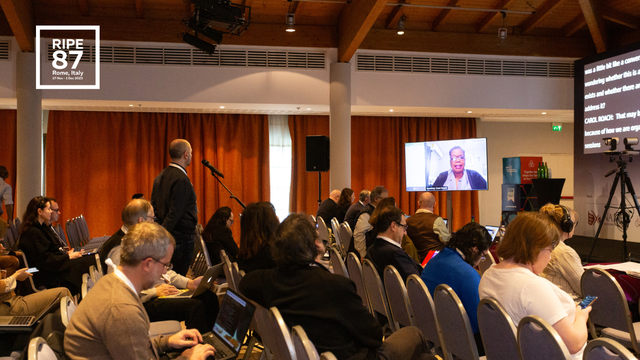
In Routing, Marco Paesani and Pietro Cassara from ISTI, who presented about 5G Non-Terrestrial Networks (NTN) and moving to the 6G era, before doing a deep dive on SRV6 and AI. Next up was Ties de Kock from the RIPE NCC, who first invited participation in usability testing of the RPKI dashboard, followed by a deep dive on the past and present of the RPKI infrastructure at the RIPE NCC. The final presentation was from Nicola Rustignoli of the SCION Association, who provided more details on the Secure Path-Aware Internet Architecture Deployment.
In the long-awaited Community Plenary, Mirjam gave a sneak peek to the new RIPE logo. Strong applause in the room - people like it! (Phew). We got an ASO AC Update and 2024 Perspective from Hervé Clement, ASO AC Chair. Then, Valerie Aurora came to test IP fragmentation knowledge. There was an interesting discussion on using Meetecho software for remote participants in RIPE Meetings and IETF meetings.
As Rome hasn’t been built in a day, creating a diverse and inclusive community is also a process that requires everyone’s support. In this Diversity and Inclusion session we’ve heard about diversity in the RIPE Meetings from the perspective of participation of academia and students and women as compared to industry stats. One of the aspects of diversity is geography. We were happy to hear from local hubs who gathered in their cities to participate in the meeting online while interacting with each other in person.


And with that, we are going to stroll around the Roman streets and get ready for the last day of RIPE 87.
Wednesday: All the Roads Lead to RIPE 87
After a group of castorinos joined us on Wednesday morning, attendees took the short crisp walk over to the main room where the day opened with Address Policy.
After a welcome from Erik Bais, Sander Steffann stepped up to talk about work in the ICANN ASO on election process planning, operating procedures, etc. Marco Schmidt gave the RIPE NCC Registry Services update, which ended on a lively discussion of the extent to which policy still reflects reality regarding IPv6 allocation (and whether it's time for closer scrutiny hereabouts). Then Angela Dall'Ara took us through an intense year of policy development across the RIRs. Finally, Leo Vegoda led a discussion session on the purpose of IPv4 assignment registration in 2024, looking for feedback on the current use of "admin-c" and how people handle contact with networks.
Outgoing co-chair for the DNS WG, Joǎo Damas, welcomed attendees in the side room and announced that Doris Hauser will fill the seat he's vacating. Joǎo has been a RIPE Working Group Chair 'in one way or other' (his words) for the past 20 years, and after a special thank you from his fellow co-chairs, the room applauded all the work he's done for the community in that time (as do we all, Joǎo!).
On to the talks, Edward Lewis asked why, after 25 years, no one is using DNSSEC, suggesting that 'maybe, just maybe, the problem isn’t the operators, it’s the protocols'. In David Lawrence's talk we heard that for any possible BHAG (Big Hairy Audacious Goal) to work for DNS evolution, it would have to (i) have low-friction incremental deployability and (ii) cannot break legacy DNS. DELEG is a tool he and his colleagues have come up with to help meet those conditions. We then heard updates on the RIPE DNS resolver recommendations task force (from Shane Kerr), the IETF DNS Operations (DNSOP) Working Group (from Tim Wicinski), and DNS activities and incidents at the RIPE NCC (from Anand Buddhdev).
In Anti-Abuse, Gerardo Viviers touched on the RIPE NCC’s e-learning initiatives for anti-abuse education, whereas Tobias Knecht highlighted the need for an overall increased community engagement, especially in addressing issues related to abuse networks. Marco Schmidt also showcased the RIPE NCC’s efforts in abuse validation and ASN cleanup, emphasising the importance of accurate and active use of resources.
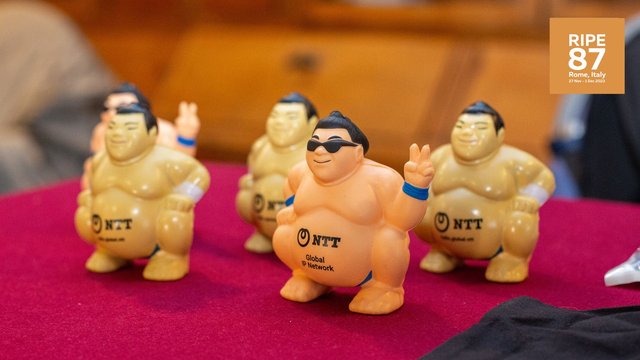
In the afternoon, the “favourite” Working Group took place, as called by Kurt Erik Lindqvist - RIPE NCC Services. The session started with a presentation on the RIPE NCC Survey 2023 results by Survey Matters. Brenda Mainland presented strategic and operational findings of the survey, with members and wider community members reporting high satisfaction with the direction of the RIPE NCC. Following up on this, Adonis Stergiopoulos shared the key findings the RIPE NCC identified from the survey results and how they will work on these areas going forward. Next, Phillip Oldham of the RIPE NCC shared the project to redesign. The project aims to improve the usability and accessibility of the RIPE NCC website, as well as give it a fresh look. We also heard from James Kennedy, the RIPE NCC’s new Chief Registry Officer, who gave an update on Registry activities and its upcoming plans. The stability, resiliency and accuracy of the Registry are major focus points for the coming year, as well as ensuring service excellence and compliance. The last speaker was Hans Petter Holen, who gave an update on the RIPE NCC overall and the major changes in the organisation, including changes in management and structure. He highlighted some of the year’s successes, like a new K-root node in Uzbekistan, and also pointed out the challenges of this year and expected in 2024 as more financial and geopolitical pressures mount. The session ended with the co-chair selection, as Kurtis Lindqvist stepped down after almost twenty years of service. Thank you, Kurtis—and congratulations to Janos Zsako, the new co-chair.

The day ended after this session and even though we did not report on the General Meeting, we saved our favourite tweet of the day, shared by Ondrej Filip. Tune in tomorrow for the rest of the WG sessions.

Tuesday: …Do as the Romans Do
On Tuesday, content after a night of wine and pasta, we continued with our plenary sessions. Rob Beverly started us off with a look into geolocating allocated IPv4 prefixes (with input from RIPE Atlas). He found that prefixes’ physical location is consistent 96% of the time with their region of allocation (and 98.1% in the RIPE region).
Massimo Candela of NTT and Sasha Romijn of Reliably Coded followed up by talking about the history of the IRRd database server and future plans for its development, as well as the plans for Near Real Time Mirroring (NRTM) v4. Raffaele Sommese of the University of Twente shared his quest to obtain a list of the domains under ccTLDs by relying on public data sources. He showed that more than half of the zones are actually already public, a revelation that will hopefully encourage ccTLDs to be more open to data transparency in the future.

In the second plenary of the day, Christian Petrasch of DE-CIX brought us along DE-CIX’s journey to build a big data platform with open source. Next up, RIPE Atlas made another appearance as Jayasree Sengupta of CISPA talked about her team’s investigation of the failure rate of DoUDP and DoTCP over IPv4 and IPv6, which found that DoUDP failed more often than DoTCP when evaluating from both the edge and core of the network.
Then, Jen Linkova of Google shared her discovery that turning off IPv4 in Google Enterprise Network only worked when they skipped dual-stack networking and went IPv6-mostly. According to Jen, you do not really operate IPv6 until you turn IPv4 off; we say, all the more reason to take the plunge headfirst into IPv6 instead of just dipping a toe.
After a delicious lunch of (more) pasta, we settled into a pleasant food coma hearing from Jayasree Sengupta again, this time on a solution for better web privacy: using DNS over QUIC alongside H3 with o-RTT. Next, Geoff Huston of APNIC took us through a light refresher on astrophysics before launching into an analysis of the Starlink satellite constellation. Like us after too much coffee, Starlink has a high jitter rate, making it unstable, but this can be minimised by using TCP with BBR.

We also had three lightning talks. Christer Weinigel of Netnod introduced us to roughtime, which, despite its name, is in fact a very accurate method for keeping track of time on devices, even when they’re switched off. Taras Heichenko shared a look into country attribute changes for Ukrainian ASNs. And Louise van der Peet of TU Delft shared her tool, privacy.txt, and its use in helping websites be compliant with GDPR without all those flashing cookie banners.
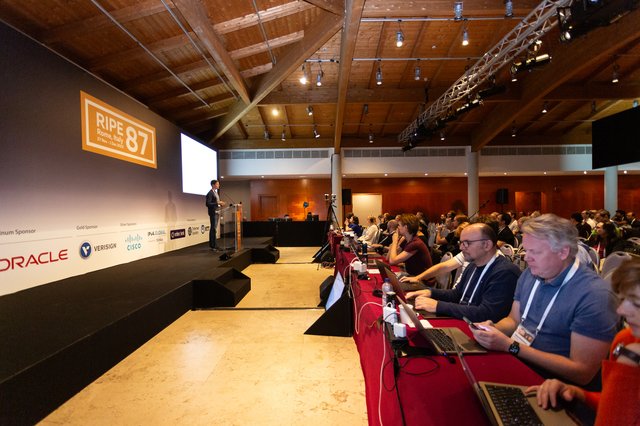
Next, we turned to our first Working Group sessions of RIPE 87. In MAT, Arturo Filastò introduced OONI, which measures internet censorship, and the OONI Measurement Aggregation Toolkit. After this, Luca Sani of Catchpoint presented a traceroute that adds new monitoring capabilities for Linux. Valentin Heinrich of Hochschule Augsburg taught us about reverse traceroute and how it can identify routing problems regular traceroute can’t. Then, Sander Constantin of RWTH Aachen University presented his research on how to effectively use ECN with QUIC. And finally, Robert Kisteleki gave an update from the RIPE NCC and mentioned two proposals that are open to community discussion, one on the role of data aggregators in RIPE Atlas and the other on RIPE NCC measurement data retention principles.
In the IoT working group session, Anna Maria Mandalari spoke about strengthening the IoT ecosystem through research into what the privacy and security implications are of using IoT safeguards. Following Anna was Eric van Uden of AVM, who shared information about Matter, a new smart home protocol, then Christer Weinigel delved into the importance and problems of time when it comes to IoT and reminded us about roughtime, a potential solution.
We finished our full day with two BoFs. In one session, Matthias Wichtlhuber of DE-CIX looked at interdomain multicast and how to better manage it. We heard the ISP perspective on this from Fredy Künzler of Init 7, the IXP perspective from Flavio Luciani of NAMEX and the content provider perspective from Viliyana Ivanova of Zattoo. In our other BoF, Urban Suhadolnik proposed CANOG: a new community gathering to reach our members in Central Asia.
And that was it for day two, before we headed off to our evening social along the banks of the Tiber for food, drink and merrymaking, just like the emperors of old.
Monday: When in Rome...
The RIPE Meeting is returning to Rome for the third time, with RIPE 21 and RIPE 61 having taken place here in 1995 and 2010 respectively. RIPE Chair Mirjam Kühne welcomed attendees and kicked off the meeting week.
Maurizio Goretti, CEO of the RIPE Meeting host Namex, provided a short introduction to Roman history, with their data centres named after Roman emperors - Tiberius, Claudius, Caesar and Augustus. A future problem, the next emperor in this illustrious line is Nero, who famously played the fiddle as Rome burned… We’ll be keeping an eye out for their upcoming data centre and its fire extinguishing system.
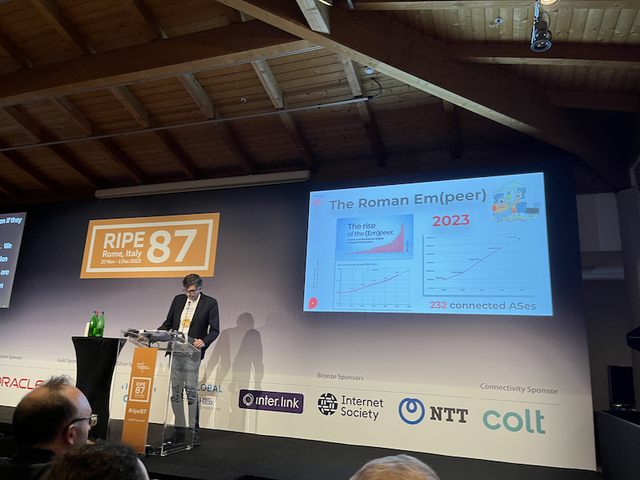
The main plenary session opened with a talk on sustainability by Romain Jacob, who started by asking the audience to point at what they thought consumed more power - data centres or telco networks. Among other things, Romain explained that in order to get more granular data researchers would need the equivalent of RIPE Atlas for power consumption. He also pointed out that the majority of the hardware failures follow the bathtub curve with hardware failing in the first 30 days and then eventually towards the end of the device lifespan.
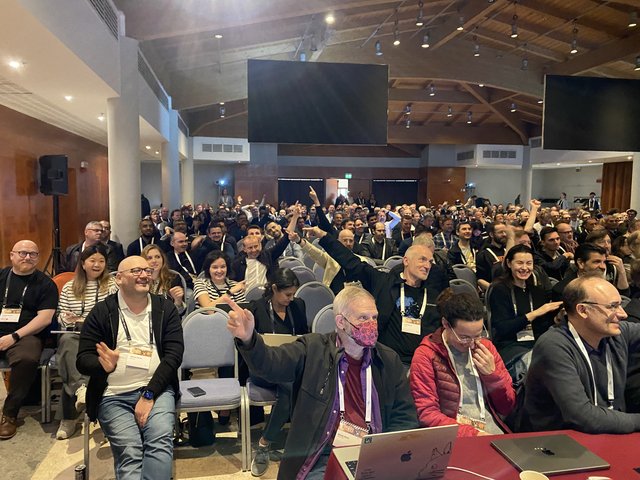
Randy Bush presented his thoughts on what he calls ‘the RIR social contract’, talking about the underlying social structures that underpin the existence of the RIRs and their “stakeholders”. And he had a fairly clear message that should be taken seriously, pink comic sans notwithstanding.

Jan Žorž and Franziska Lichtblau left us in suspense as they ran through who won the Rob Blokzijl Award without telling us who had won the Rob Blokzijl Award. Here are some hints - the awardee sent a total of 1,280 emails to the mailing lists, the Internet Society added him to their Internet Hall of Fame and the awardee was an unrepentant hippie and dedicated mentor.
Did you guess? If you hadn’t worked it out, they provided a handy limerick to unveil the awardee:

Yes, it was Randy Bush who received the Rob Blokzijl Award, which celebrates those who have contributed to the development of the Internet in the RIPE NCC service region.
Randy gave a modest acceptance speech, noting that Rob had been another old hippie and leader who spoke simply with honesty and integrity and prized community over divisiveness and cooperation over power.
Randy said that he is "the third old white man to win the award which is a bug not a feature" (his words exactly) and that there were a number of women in the room who have been here longer. He said that we have strong women in this culture and we should be promoting them. He nevertheless said this was quite the honour since he had always wanted to grow up to be like Rob.
The first day also saw the BCOP Task Force continue to discuss best practices, MANRS and Internet resilience in times of natural disasters and war, and Romain Jacob continued the discussion on sustainability that started during his talk in the Opening Plenary.
The evening wrapped up with the welcome reception aka the Pasta BoF, which has been set up to provide input on the RFC set up to "standardise the preparation of pasta alla carbonara" and no you SHALL NOT put pineapple on a pizza.

Have FOMO? Wishing you were here? You can watch the talks in the archive!

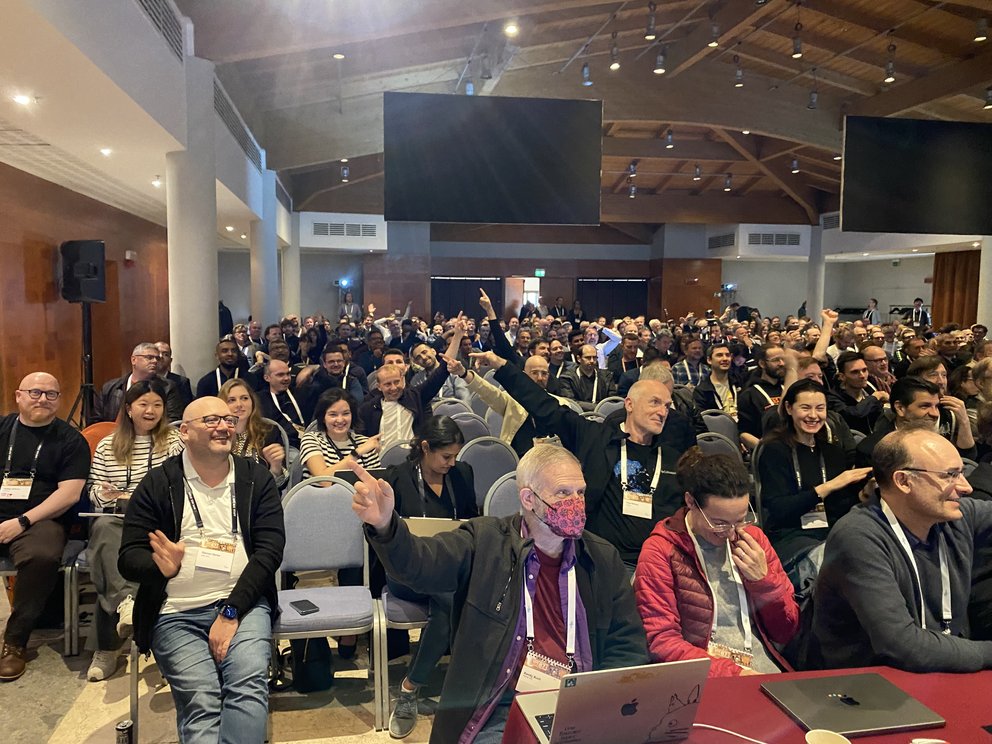
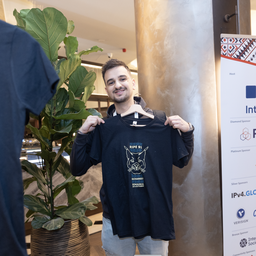
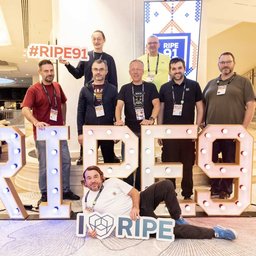

Comments 1
The comments section is closed for articles published more than a year ago. If you'd like to inform us of any issues, please contact us.
James •
Congrats Randy: https://btw.media/randy-bush-honoured-at-ripe-87-after-calling-rirs-a-monopoly/